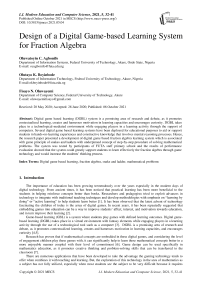Design of a Digital Game-based Learning System for Fraction Algebra
Автор: Oluwatoyin C. Agbonifo, Olutayo K. Boyinbode, Fisayo N. Oluwayemi
Журнал: International Journal of Modern Education and Computer Science @ijmecs
Статья в выпуске: 5 vol.13, 2021 года.
Бесплатный доступ
Digital game based learning (DGBL) system is a promising area of research and debate, as it promotes contextualized learning, creates and harnesses motivation in learning capacities and encourages curiosity. DGBL takes place in a technological-mediated environment while engaging players in a learning activity through the support of computers. Several digital game based learning systems have been deployed for educational purposes to aid or support students in hands-on-learning experiences and constructive knowledge that involves mental reasoning processes. Hence, the research paper presented a development of digital game based fraction algebra learning system which is associated with game principle of snakes and ladders with underpinned concept of step-by-step procedure of solving mathematical problems. The system was tested by participants of FUTA staff primary school and the results of performance evaluation showed that the system could greatly support students to learn effectively the fraction algebra through game technology and would increase the students’ thinking process.
Digital game based learning, fraction algebra, snake and ladder, mathematical problems
Короткий адрес: https://sciup.org/15017719
IDR: 15017719 | DOI: 10.5815/ijmecs.2021.05.04
Список литературы Design of a Digital Game-based Learning System for Fraction Algebra
- A. Serdar, Game-based Improvement of Learning Fractions Using IOS Mobile Devices, Master of Science Thesis Submitted to the Faculty of the Virginia Polytechnic Institute and State University, Placksburg, Virginia., 2011.
- K. Squire, Video Games in Education, International Journal of Intelligent Simulations and Gaming, Vol 2, Issue1, pp. 49-62, 2003.
- R. Teed, Game-Based Learning. Retrieved from the Carleton College, Available at: http://serc.carleton.edu/introgeo/games/index.html, Accessed on May, 2017.
- J. Gee, Learning and Games. In K. Salen (Ed.), The Ecology of Games: Connecting Youth, Games and Learning pp. 21–40, 2008.
- J. Kirriemuir and A. McFarlane, Literature Review in Games and Learning. Bristol: Nesta Future Lab, pp. 10 – 20, 2004.
- M. Prensky, Digital Game-Based Learning: Exploring the Digital Generation, Educational Technology, U.S. Department of Education, pp 20 – 60, 2003.
- Q. Li, Digital game building: Learning in a participatory culture. Educational Research, 52(4), pp 427–443, 2010.
- D. Bouhineau, J-F. Nicaud, H. Chaachoua, M. Bittar and A. Bronner, Two Years of Use of the Aplusix System. Proceedings of WCCE’2005, the 8th IFIP World Congress on Computers in Education, pp 1301 – 1311, 2005.
- E. Turtiainen, S. Blignaut, C, Els, T. H. Laine and E. Sutinen, Story-Based UFractions Mobile Game in South Africa: Contextualization Process and Multidimensional Playing Experiences, In Proceeding of the Second Workshop Story Telling and Educational Games, South Africa, 2009.
- O. C. Agbonifo and O. P. Onu, Development of a Digital Game-Based Algebraic Learning System, International Journal of Scientific and Engineering Research, 8(12) pp.863-869, 2017.
- M. Prensky, Digital Game-Based Learning. New York: McGraw-Hill, pp 1-20, 2001.
- G. Garcia, Digital Game Learning. In B. Hoffman (Ed.), Encyclopedia of Educational Technology, pp 200- 300, 2005.
- C. Aldrich, Simulations and the Future of Learning. San Franscisco, CA, pp. 534 -581, 2004.
- D. H. Schunk, Learning Theories: An Educational Perspective (4th ed.). Upper Saddle River, NJ: Merrill & Prentice Hall, pp. 23- 45, 2004.
- B. Fuszard, Gaming. In Lowenstein, A. J., Bradshaw, M. J. & Fuszard, B. (eds.) Fuszard's Innovative Teaching Strategies in Nursing. 3rd ed. Gaithersburg, MD, Aspen Publishers, pp. 234 – 500, 2001.
- J. M/ Keller, Strategies for Stimulating the Motivation to Learn. Performance and Instruction, 26(8), pp. 1-7, 1987.
- W. Huang and T. Johnson, Instructional Game Design using Cognitive Load Theory. In R. Ferdig (Ed.), Handbook of Research on Effective Electronic Gaming in Education, pp. 1143-1165, 2008.
- K., B. Chang, C. Lai and T. Chan, Joyce: A Multi-Player Game on One-on-One Digital Classroom Environment for Practicing Fractions, In Proceedings of the Fifth IEEE International Conference on Advanced Learning Technologies (ICALT’05), pp. 543-544, 2005.
- S. C. Kong, The Development of a Cognitive Tool for Teaching and Learning Fractions in the Mathematics Classroom: A Design-Based Study, Computers & Education 51 (2), pp. 886-899, 2008.
- O. C. Agbonifo and A, O, Ogunmoroti, A Digital Lego-Based Learning Environment for Fraction Ordering, Nigerian Journal of Technology, 34(4) pp. 781-787, 2015.
- T. Bouzid, H, Darhmaoui and F. Kaddari, Promoting Elementary Mathematics Learning through Digital Games, Proceedings of the 2nd International Conference on Big Data, Cloud and Applications, http://dx.doi.org/10.1145/3090354.3090451, 2017.


